Five pro-life leaders, who protested inside a D.C. abortion clinic, are facing over a decade in federal prison after a jury trial found the co-defendants guilty of violating a Clinton-era law that forbids interference with so-called "reproductive health care services."
For forming a pro-life "blockade" on Oct. 22, 2020, that "obstruct[ed] access" to the Washington Surgi-Clinic (WSC), an abortion shop in the nation's capital that advertises that babies "up to 27-plus weeks" of pregnancy are aborted there, Lauren Handy, Will Goodman, John Hinshaw, Heather Idoni, and Herb Geraghty were convicted last Tuesday on charges brought forth by Biden's Justice Department: felony conspiracy against civil rights and Freedom of Access to Clinical Entrances (FACE) Act violations.
DOJ attorneys prosecuting the pro-life activists allege that the co-defendants "engaged in a conspiracy" by mobilizing on Facebook beforehand, an event that the mostly Christian "co-conspirators" organized as a faith-based "rescue" to save babies from being slaughtered. "In furtherance of the conspiracy," Handy, Hinshaw, Idoni, Goodman, and Geraghty traveled to the District of Columbia, hailing from an assortment of northeast and midwestern states, to participate in the live-streamed protest.
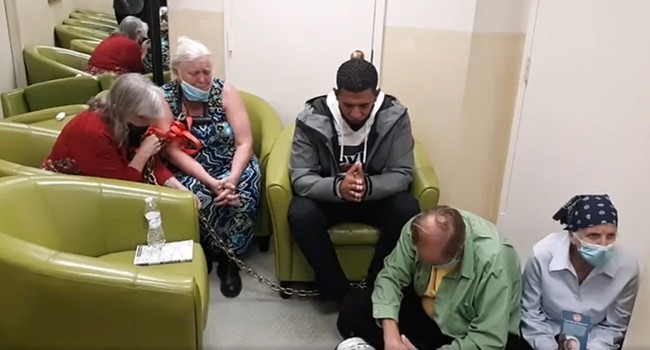 Washington Surgi-Clinic pro-life protest on Oct. 22, 2020 | DC Area Anti-Abortion Advocacy (Facebook)
Washington Surgi-Clinic pro-life protest on Oct. 22, 2020 | DC Area Anti-Abortion Advocacy (Facebook)
According to the two-count indictment, within the waiting room, the pro-life protestors blocked the abortion business's doors with furniture, rope, and themselves (bound together by chains) as "a physical obstruction" to impede the facility's baby-killing operations. There, the "rescuers" sang hymns, such as the Immaculate Mary, and recited the St. Michael the Archangel prayer.
Recommended
At the trial, which commenced on Aug. 9, a nun praying the rosary in the gallery, joined by a priest reading Bible verses, was reportedly reprimanded for making the sign of the cross in the direction of the witness stand. Other observers had been ordered on Day One of witness testimony not to pray "visibly," because doing so could be perceived as "threatening" acts of intimidation.
Post-conviction, the pro-lifers each face up to 11 years behind bars, three-years supervised release, and a fine of up to $350,000. U.S. District Judge Colleen Kollar-Kotelly, a feminist Clinton appointee presiding over the case whose pre-trial rulings recurrently aligned with the whims of pro-abortion apparatchiks, ordered the co-defendants to be immediately incarcerated upon the DOJ's request for detainment, claiming the pro-life "rescuers" committed a "crime of violence" under federal law. Following the guilty verdict's reading, an "army" of U.S. Marshals swiftly herded the five co-defendants out of the courtroom, Live Action reported.
In closing statements, Hinshaw's attorney pleaded that the only individuals to turn towards violent behavior were the WSC's staff members, one of whom brandished a broomstick and used it to jab at the rescuers, the defense counsel said. Aside from the sit-in, some of the activists kneeled and prayed, some passed out pro-life literature, and some counseled abortion-seeking women.
Attorneys for Idoni, Geraghty, and Handy have vowed to pursue appeals. Sentencing will be scheduled at a later date.
A separate trial against the remaining four jointly indicted co-defendants is set to begin on Wednesday, Sept. 6.
"For doing right, they now want to send me away for 11 years. I'm 68. 11 years will probably finish it," one of the convicted pro-life defendants, 68-year-old Hinshaw, of Long Island, New York, told Townhall. Ahead of the trial, Hinshaw exclusively spoke to Townhall to address the case's eyebrow-raising timing, concerns of jury-packing, and the pro-abortion judge's political pontification in court orders. In the trial's aftermath, it's evident that the case reeked of bias from the very outset.
another one of the defendants, John Hinshaw
— Maria (@RehumanizeMaria) August 13, 2023
unfortunately I didn’t get to finish his portrait because (despite there being no rule against it) court security made me stop drawing, and a US Marshal took my sketchbook 🙃
tensions are high — continue to pray for the defendants! https://t.co/JjzDPClz5T pic.twitter.com/voOQn8bbyt
The Jury
Speaking on the "nightmare" jury-selection process, the pro-life leader, who has "been through a few of them," said that pro-lifers are "almost always" disqualified. "Again, it says something about the system," Hinshaw stated, observing how would-be jurors with pro-life beliefs oft-admit to the court: "Yeah, I can't be impartial. I'm biased over the issue." Hinshaw, in disbelief, reacted: "What?! Of course, you have the ability to judge this fairly. But, pro-lifers, who tend to be the more honest among us, take themselves off these juries all the time. And, it blows my mind. I don't see abortion-clinic workers taking themselves off juries."
According to Catholic News Agency, the jury pool was stacked with pro-abortion activists who admittedly marched for abortion and donated to Planned Parenthood. When the pro-life defense implored Kollar-Kotelly to remove the self-identifying lot from the jury panel, the judge reportedly refused to strike for cause the handful of potential jurors who confessed to being pro-abortion and defended the inclusion of the pro-abortion prospects on the grounds that "access to abortion is legal," LifeSiteNews reported.
The jury candidates were handed a card containing 34 voir dire questions. Of which, the abortion-related inquiries were:
- Question 20: "In this trial 'abortion' will be mentioned, but this case is not about abortion—not whether it is right or wrong, just or unjust—it's about whether clinics have a right to operate. Do you have any beliefs about abortion that would render you to not be fair and impartial in this case?"
- Question 21: "Have you ever belonged to or contributed to any group that advocates for or against abortion?"
- Question 22: "Have you or a close friend or family member ever participated in any demonstration either for or against abortion?"
Four pro-abortion respondents answered "Yes" to Questions 20, 21, and 22. Two diclosed being Planned Parenthood donors, supporting legalized abortion, and feeling that access to abortion was important to them. Another said his wife contributes money to Planned Parenthood through the couple's joint bank account, but he's fine with the donations, stating he was supportive of the cause and sympathetic to the pro-abortion organization. One woman, employed as a consultant for a Democrat congresswoman who backs legalizing abortion, said she attended women's marches in D.C. because the demonstrations rallied for abortion.
Notably, one man said he was very much against abortion. Kollar-Kotelly told the prospective pro-life juror that this case has nothing to do with whether abortion is right or wrong, justified or unjustified, only about if there should be lawful access to abortion. "Can you set aside your deeply held views on abortion and impartially weigh the evidence presented in this case and apply the law according to the statute?" he was asked. The potential juror candidly responded, "It would be hard for me to separate my views from the facts of this case." Pressed by the judge on whether he could simply apply the statute, he said, "I don't think I can enforce a statute with which I do not agree." When prodded by the DOJ prosecution, the jury pick went so far as to say, "I don't think there should be access to abortion" and "I am only half-certain," when it comes to setting aside his views to apply the law. As Hinshaw alluded, the magic words were: "Despite my deeply held views, I could still be fair and impartial."
That was enough for the judge, and she struck him for cause, though the man did voice some pushback regarding the pro-life defense's "rescue" tactics: "People who take matters into their own hands, I don't necessarily agree that's the correct method."
Day Two of the jury-picking process ended with a total of 26 passing the voir dire screening. Of the 26 jurors thus far, the pro-abortion picks outweighed the pro-lifers nearly 4 to 1, LifeSiteNews counted. Altogether, there were 11 pro-abortion individuals.
During jury deliberations, the jurors sent a series of questions to Kollar-Kotelly.
First, the jury asked: What do "oppression" and "intimidation" mean as defined by law? Second, pertaining to a particular pregnant client at the clinic, who was on the final day of a three-day abortion procedure and experiencing labor pains when she arrived the date of the pro-life rescue: What were the exact medical symptoms of the woman who collapsed in the hallway? And third: What is the nature of "treatment" for each of the different abortion procedures offered at the Washington Surgi-Center?
Ms. Hollar cried as she gave her testimony. Prosecution showed a video of her falling to the ground in pain in the hallway outside WS, and pro-lifers rushing to aid her. She doesn't recall this as she was in so much pain she wasn't lucid.
— #PAAUonTrial Updates (@PAAUonTrial) August 17, 2023
Throughout the trial, the DOJ prosecution claimed the defendants crafted "a scheme to interfere with others' rights," employing pro-abortion euphemisms, such as referring to abortion procedures as "medical care" and "treatment" that's "absolutely needed."
A discussion unfolded about whether to define the terms "oppression" and "intimidation" narrowly, as in the FACE Act, or more broadly, as they're frequently defined under conspiracy charges. Ultimately, the judge settled on a broad definition. With regard to the final two questions, the judge gave the jury no answers; the second because private medical conditions are not relevant, Kollar-Kotelly said, and the third on the grounds that there was no evidence presented at trial about specific abortion procedures.
 Abortion services offered at the Washington Surgi-Clinic
Abortion services offered at the Washington Surgi-Clinic
The Judge
"The federal right to abortion no longer exists because of Dobbs, which should make FACE moot," Hinshaw asserted.
Pro-lifers see the DOJ case as a reflection of the FACE Act's unequal enforcement. Though the FACE Act should theoretically protect pro-life pregnancy counseling centers, which were especially under attack during the destructive pro-abortion "Summer of Rage," it is seldom invoked by "devout Catholic" Biden's administration to prosecute pro-abortion militants. Instead, the Biden admin's heavy-handed bureaucrats have brandished the FACE Act as a post-Roe weapon to bludgeon political dissidents.
Most pro-life rescuers enter abortion clinics with an understanding that they're subject to arrest and prosecution, but at the local level, likely for a low-rung offense like misdemeanor trespassing, not trumped-up federal charges under the FACE Act.
In a motion to dismiss the indictment on grounds that the FACT Act cannot be applied post-Roe, the defense attorneys representing Handy contended that Congress no longer has the jurisdiction to regulate abortion access; therefore, the conspiracy charge is not legitimate because the overturning of Roe v. Wade took Congress out of the business of legislating abortion.
Despite the landmark Dobbs v. Jackson Women's Health Organization decision that returned the matter of abortion restrictions to the states, Kollar-Kotelly, a Clinton-appointed judge overseeing the DOJ's application of the Clinton-signed FACE Act, floated the argument in a Feb. 6 court order that "abortion rights" are constitutionally protected, citing pro-abortion legal scholar Andrew Koppelman, who opined in a 1990 paper that "forcing [women] to be mothers" violates the Thirteenth Amendment, because "coerced pregnancy" is "involuntary servitude." Essentially, the columnist compared unwanted motherhood to slave labor.
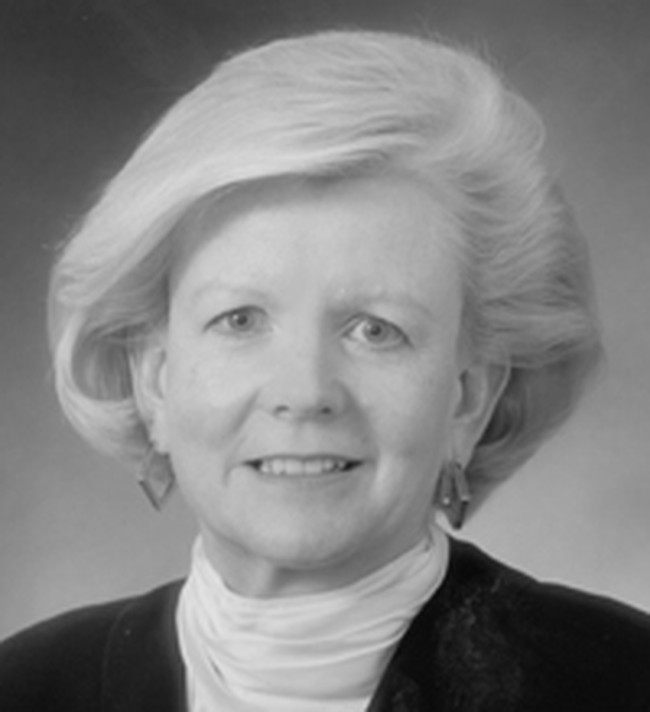 Judge Colleen Constance Kollar-Kotelly | Wikipedia
Judge Colleen Constance Kollar-Kotelly | Wikipedia
"The injury inflicted on women by forced motherhood is less in degree than that inflicted on blacks by antebellum slavery [...] but it is the same kind of injury," Koppelman, a Northwestern University law and political-science professor, penned. "When abortion is outlawed, a woman does not want to carry her pregnancy to term must serve the fetus, and that servitude is involuntary."
Requiring the defendants to entertain the legal theory, Kollar-Kotelly ordered all parties to file supplementary briefings, each arguing whether the Thirteenth Amendment or "any other provision of the Constitution could confer a right to abortion."
“Dobbs may or may not be the final pronouncement, leaving an open question," Kollar-Kotelly suggested.
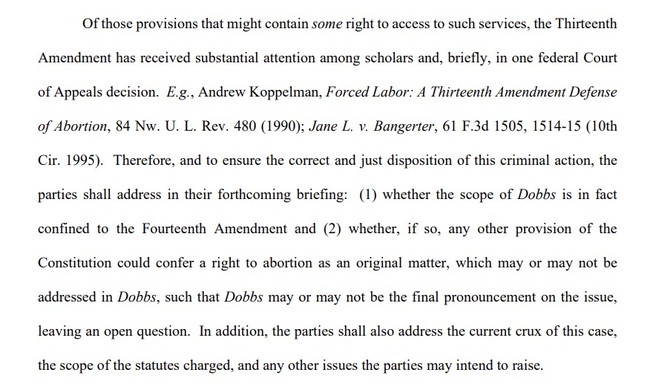 Kollar-Kotelly's Feb. 6 court order on a Thirteenth Amendment protection | U.S. v. Handy, et al.
Kollar-Kotelly's Feb. 6 court order on a Thirteenth Amendment protection | U.S. v. Handy, et al.
"She's a completely compromised crazed feminist, who was determined to find a right everywhere..." Hinshaw said of the Clinton-appointed judge, adding: "It's sophistry; it's appearing to know the law when you don't know the law." Scoffing at Kollar-Kotelly's take, Hinshaw remarked that the Thirteenth Amendment, which abolished slavery, was written "so that certain human beings could not be treated as property by other human beings. That's the definition of abortion," the dehumanization of unborn children.
In the lead-up to the trial, Kollar-Kotelly ruled against the pro-life defendants on a multitude of motions.
At the time of Townhall's pre-trial interview with Hinshaw, the DOJ prosecutors had filed a flurry of motions to "limit what our defense can be," the pro-life defendant said. "And consequently, the idea that [the court] can now limit our defense to whatever they and the Department of Justice decide it is is ludicrous; it's ludicrous," he emphasized. "To say this is a simple trespass case without discussing why we trespassed, it's a violation of our rights that we can't present to our defense," Hinshaw countered.
"This is probably the reason they want to crush us is that every major social change in America has involved some form of civil disobedience," Hinshaw said, citing the written works of civil rights pioneer Dr. Martin Luther King, Jr., whose "Letter from Birmingham Jail" composed in defense of non-violent resistance argued that citizens are morally bound to peacefully resist unjust laws like Jim Crow segregation rather than wait for justice to come through the courts, and theologian Thomas Aquinas, who exhaustively examined the legitimacy of man-made laws and whether laws made through human conventions should be obeyed.
"An unjust law is no law at all," Hinshaw quoted, then asserted: "And if you're butchering children on your property, you can't claim property rights against me if I come on to stop you [...] My perspective was that I was helping prevent a federal crime."
Late-term baby butcher Dr. Cesare Santangelo, the sole-practicing abortionist running the Washington Surgi-Colinic abortion mill, is suspected of deliberately leaving living babies to die after botched abortions and violating the Partial-Birth Abortion Ban Act.
Babies born alive at any stage of development are "persons" protected by federal law under the Born-Alive Infants Protection Act, thus requiring life-saving care. Partial-birth abortion is the term Congress uses to recognize abortion becoming infanticide, in which an abortionist delivers a substantial portion of a living child outside the mother's body—the whole head in a head-first delivery or the trunk past the navel in a feet-first one—then kills the baby by crushing the skull or removing the brain by suction.
Assistant U.S. Attorney Rebecca G. Ross had argued under the trial brief's "Anticipated Defenses" section that the "why" behind what the co-defendants allegedly did is "irrelevant," and so, any attempt to introduce contextual evidence "should be excluded."
Mentioned in the brief was the federal government's omnibus motion filed in limine that sought to preclude the pro-life defendants from arguing that their conduct is First Amendment-protected, even if the crimes were "intertwined with political, religious, or moral discussions and/or rheotric," as well as bar them from introducing character evidence, which would've established the defense's charitable works, affiliations with religious or social organizations, admirable family lives, and community standing.
A week before trial, on Aug. 2, Kollar-Kotelly granted the prosecution's set of evidentiary requests.
"I think we should be able to account for ourselves [...] We have a right to present whatever defense we have," Hinshaw fired back at the defense limitations. "And, I think it's monstrous that a judge can just say, 'Nope, you're not allowed to do that.'"
In proposed jury instructions, Handy's lawyers asked to tell the jurors that the pro-life leader's "otherwise criminal conduct may be excused" out of "necessity," since "she acted to prevent imminent harm." This necessity defense argued that Handy had to break the law because she believed it was necessary to do so. Similarly, attorneys for Handy and Hinshaw's co-defendant, Heather Idoni, submitted a separate request for a jury instruction, explaining that Idoni acted in "defense of a third person" and indicating she intended to take the stand to testify that she "believes unborn children are legal persons from the point of conception." Hence, Idoni's counsel asserted, the use of force was circumstantially necessary to save another human being's life.
Outlining in the federal government's opposition, U.S. Assistant Attorney General Kristen Clarke for the DOJ's Civil Rights Division co-wrote: "These requests should be rejected because they are premised upon the flawed arguments that abortion is an unlawful attack, and that fetuses, which the defendants claim they sought to protect, were 'persons' [...] Here, the defendants cannot establish that they acted to aid an innocent victim of an unlawful attack. First, the defendants cannot establish that anyone, let alone any fetus, was facing an unlawful threat because abortion was legal at the time of the offenses and continues to be in the District of Columbia [...] Fetuses are not considered 'persons' under federal law..." Thus, pro-life defendants cannot claim a defense of others, the DOJ declared, because "an abortion is not an unlawful harm, and a fetus is not a person."
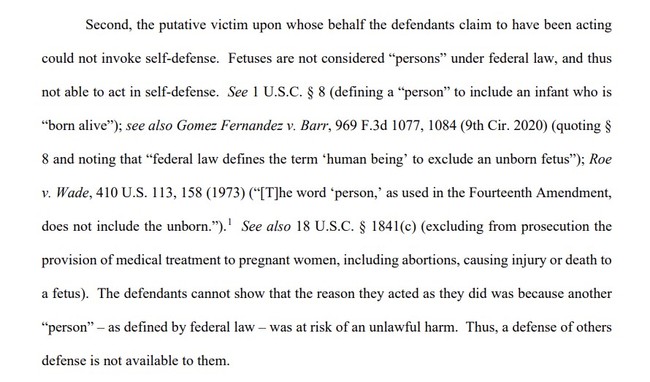 DOJ's July 24 opposition to the defense's jury instructions | U.S. v. Handy, et al
DOJ's July 24 opposition to the defense's jury instructions | U.S. v. Handy, et al
Kollar-Kotelly's Aug. 7 opinion, yet again, sided with the DOJ, ruling that both defense claims (necessity and third-person defense) were inadmissible and "merit little discussion." The co-defendants "may not don a vigilante's hood to insert themselves into a situation of their own making and subsequently claim defense of a third person to justify their actions," Kollar-Kotelly wrote.
"The only thing that matters is that these people came in when they weren't supposed to come in," Hinshaw mimicked.
Handy wanted to submit as evidence a secretly recorded video of Santegelo, which she said was the impetus for the rescue.
In an undercover 2012 Live Action video, Santangelo was caught on camera confessing to letting babies die if the infants were accidentally delivered during failed abortions. In the six-minute recording, Santangelo told an expectant mother that, sometimes, "I cut the umbilical cord first, wait for the baby to expire, and then we do it that way." When the pregnant woman asked Santangelo whether the baby might "move" if he or she was born alive, the abortionist explained again: "That's why I try and sever the umbilical cord first. And, we wait for that to stop pulsing, and this way, the fetus is expired first, so it doesn't."
"We would not help it. We wouldn't intubate, let's say," Santangelo said, emphasizing he "wouldn't do any extra" in terms of life-saving measures, comparing it to allowing a terminally ill patient with a DNR to die. "Like a 'do not resuscitate' order," he added.
Santangelo noted that if the mother were to go into labor at a hospital, medical professionals would do everything possible to help her baby survive. "But you won't?" the woman, who was 24-weeks pregnant, questioned. "That's happened before,” Santangelo said. “We've had patients that, you know, on the second day of the laminaria, they got some contractions and they panicked, and they were in Virginia at the hospital, they went to the hospital, because they had some pain, instead of calling me."
The hospital helped the mothers deliver, Santangelo stated, calling the life-saving act "the stupidest thing they could have done."
Shortly after the six-minute video's release, Santangelo told The Washington Post that he stood by what he said on tape. "What I said is, basically, I wouldn't do anything extraordinary," the abortionist clarified, insisting that the clinic would alert emergency services. "We would call EMS. We would call 911. But I wouldn't do intubation or anything [...] You let nature take its course."
Upon reviewing the full 50-minute video, Kollar-Kotelly decided that Handy "mischaracterized" statements from the footage. "At no time in the video is there any indication that the doctor would, as Defendant characterizes it, either ensure a born-alive fetus's death or affirmatively perform a post-birth abortion," the judge continued, concluding that the source is "stale" to rely on as it predates the pro-life blockade. Kollar-Kotelly dismissed the video of Santangelo as "heavily edited" "gossip from propagandists," not allowing it to be played before the jury nor permitting Live Action to testify in defense of the footage's authenticity.
Both Judge Kollar-Kotelly and the prosecution are calling @LiveAction's video "heavily edited" and "propaganda."
— Lila Rose (@LilaGraceRose) August 22, 2023
Neither has provided any evidence to defend their claims & Judge Kollar-Kotelly prevented Live Action from testifying in defense of the authenticity of the footage.
Via an exhibit list, Handy's defense counsel also petitioned to enter into evidence pictures of five late-term aborted babies recovered from Santangelo's clinic. Kollar-Kotelly's Aug. 3 order struck down the pro-life defendant's request. "...[T]he Court will not permit Defendants to show photos of expired fetuses (or, in their telling, dead babies) and the containers in which the fetal remains were purportedly placed," Kollar-Kotelly wrote. "Such photos are particularly incendiary and entirely distracting from the events at issue. The truth of the procedures related to the fetal remains are not, as Defendant concedes, relevant to this case."
The judge acknowledged Handy's reasoning that she believed, at the charged conduct's time, that the Washington Surgi-Clinic was performing post-birth abortions, which are "undoubtedly unlawful under state and federal law," Kollar-Kotelly concurred. "Based on this subjective belief, Defendant proffers that her sole intent in undertaking the charged conduct was to obstruct post-birth abortions [...] The truth of the procedures related to the fetal remains are not [...] relevant to this case," the judge ordered.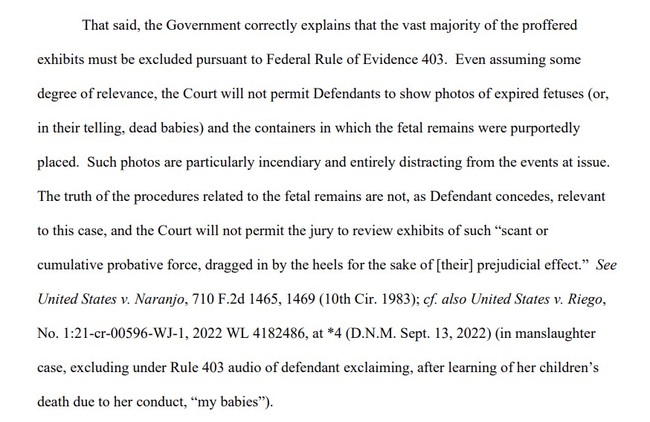 Kollar-Kotelly's Aug. 3 court order on Handy's exhibit list | U.S. v. Handy, et al.
Kollar-Kotelly's Aug. 3 court order on Handy's exhibit list | U.S. v. Handy, et al.
The Clinic
About one-and-a-half years after the 2020 protest, the DOJ's decision to bring forward federal charges suspiciously coincided with Handy, the lead defendant, discovering five full-term aborted babies, as well as 110 "mostly pulverized" first-trimester infants, that Handy's organization, Progressive Anti-Abortion Uprising (PAAU), salvaged from Santangelo's abortion business aboard a delivery truck. PAAU intercepted the shipment that was allegedly en route to an incinerator in Baltimore, run by Curtis Bay Medical Waste Services, to be disposed of as "waste." (The "waste-to-energy" incineration company, which touts the nation's largest medical-waste incinerator and "sustainable" processing that outputs the market's "lowest carbon footprint," is accused of burning the corpses of aborted babies, "converting" the infant cadavers into "useful energy," to generate electricity.)
Are aborted babies being burned to keep the lights on in Baltimore? Curtis Bay Energy is the company who was picking up boxes of aborted baby remains at Cesare Santangelo’s facility.
— Live Action (@LiveAction) April 8, 2022
Curtis Bay Energy denies involvement. Spread this post. pic.twitter.com/uTDZmPB3FH
PAAU's members went to the Washington Surgi-Clinic to perform "a pink rose rescue," a form of protest in which pro-life demonstrators deliver pink roses to women scheduled to undergo abortions along with alternative resources, when the activists allegedly noticed a Curtis Bay Medical Waste Services truck parked outside the facility and confronted the driver, requesting they take the boxes he was transporting. After the employee with the medical-waste disposal company allegedly obliged, much to their horror, they found dozens of plastic containers inside holding the fetal remains of 115 aborted infants—five of which were full-term babies. It just so happened that the heart-wrenching discovery took place on the International Day of the Unborn Child.
PAAU published a full-length YouTube video (WARNING: graphic footage) of them opening a biohazard bag containing the five mangled bodies of the late-term babies. A short clip was posted to PAAU's YouTube channel showing the severed body parts of the 110 predominantly first-trimester babies, with their intestines and lungs exposed as well as bodies that were contorted or shredded in abortions. PAUU has posted photographs and mini-biographies of the babies (WARNING: disturbing images).
"Baby Girl #1," posthumously named "Harriet," was found whole except that her brain was suctioned out and her skull crushed. Medical experts told The Daily Wire that Harriet's injuries were consistent with what's expected from a partial-birth abortion.
Upon reviewing photographs of the aborted babies, former obstetrician-gynecologist Kathi Aultman, a retired board-certified OB/GYN and an associate scholar with the pro-life Charlotte Lozier Institute, assessed that Baby Harriet was aborted in either the late-second or early-third trimester. According to Aultman's estimation, the girl was larger than most of the babies she has cared for in the NICU (neonatal intensive care unit) and likely had a decent chance of surviving at her gestational stage and size.
Dr. Kendra Kolb, a neonatologist who specializes in caring for premature babies with complex high-risk health conditions, also agreed that Harriet appeared to be between 28-30 weeks. The National Library of Medicine notes that at Harriet's gestational age, all parts of the baby's eyes are developed, fingerprints are forming, and the baby "may startle in response to loud noises." Harriet's single eye remains open, burning into the memory of many as a symbol "to never stop looking for justice," PAAU says.
"Baby Girl #2," named "Holly" after a pro-life whistleblower, looked to be in the second trimester, between 26-28 weeks of gestation, and aborted through dilation-and-evacuation (D&E), known as piece-by-piece dismemberment abortion via forceps.
"She has been dismembered," per Aultman's analysis. "Her head has been crushed or possibly decompressed using suction inserted through an incision in the skull." Based on the baby's detached arm and severed torso, Kolb saw "evidence of both dismemberment of her upper extremity, decapitation, and organ evisceration as the result of this unimaginably brutal procedure.".
"Baby Boy #1," named "Christopher X," had a fully formed face, fingers, toes, and all the features newborns possess. Aultman, an ex-abortionist turned pro-lifer, told Live Action News that the baby boy appeared to be near-term third trimester and "should have been in the nursery." Kolb estimated Christopher X's age was as late as 32-weeks gestation. The National Library of Medicine says that at 32 weeks, the baby has lungs, a beating heart, and other major organs, with the ability to hear, a rapidly growing brain, a nervous system "developed enough to control some body functions," and eyelids that can open and close.
All of the five babies were believed to be of "viable" gestational age, Kolb said, which means if delivered alive, the children had fairly good chances of survival outside of the womb with appropriate medical support. Kolb stressed that babies are "pain-cable" at this point in development, especially those whose lives were savagely ended by D&E abortion. Unborn babies forced to undergo this "barbaric" practice are expected to experience "excruciating pain," Kolb stated. PAUU has since called on the D.C. Medical Examiner's Office to perform full autopsies of the babies, a request the chief medical examiner has refused to fulfill.
PAAU turned over the five babies of advanced gestational ages to law enforcement for forensic examination. On the same day that D.C. Metropolitan Police homicide detectives were arranged to pick up the aborted babies, DOJ prosecutors unsealed the federal indictment against the pro-life defendants, launching a multi-state raid that rounded up the anti-abortion advocates.
"It clearly looks like the government has been weaponized," Hinshaw stated. "I absolutely believe that the abortion industry has the federal government working for it [...] In terms of the government conspiracy, there's no question they were conspiring against us. The only question is: Was it in response to Justice for the Five? Or, was it simply: 'No, no, we just always protect abortion.'"
Hinshaw alleged that the moment the pro-life rescuers entered the abortion clinic's waiting room, Santangelo's secretary called the FBI: "I have suspicions that they needed to jump because of what was being found out about Santangelo. I don't know that for certain though. I do think that they were involved early on in a protection racket [...] The abortionist had the FBI on speed dial."
"The fact that the FBI came to interview us while we were in jail, the day of the rescue, indicated a hyper-vigilant—This is the same Department of Justice that can't seem to find time to investigate child trafficking, the Bidens, and everything else, but they were right there waiting to jump on pro-lifers. And, in fact, I pointed out to the guy who interviewed me from the FBI that Portland was burning while he was sitting there interviewing me!" Hinshaw exclaimed. At the time, George Floyd-era Black Lives Matter riots were still ravaging Portland, where Antifa militants firebombed the riot-torn city's federal courthouse, through the fall of 2020.
"What kind of idiot thinks that this is the hill to die on—we're going to defend this guy," Hinshaw contemptuously chortled, alluding to beliefs that the DOJ pounced on the pro-life activists as part of a coordinated "cover-up" to shield Santangelo from scrutiny.
The Raid
Hinshaw recalled the "harrowing" FBI raid on his home in the early hours of March 30, 2022, when nine federal agents, pouring out of five SUVs, descended on the Hinshaw residence to handcuff him in front of his wife and children and toss him in a jail cell.
That morning, it was 6:00 a.m. and Hinshaw, a veteran in the human-services profession with experience helping the homeless and recovering addicts, was about to head into work, a residential program where he cares for mentally ill adults. "The coffee was being made and I was getting ready to prepare a little breakfast for myself," Hinshaw recollected. That's when he noticed "a strange light" shining through the curtains of his kitchen, an oddity given it was just before dawn and the sun was yet to rise.
"So, I turned around and the light disappeared. And then, two seconds later: Boom! Boom! Boom! Pounding on the door. 'Open up in the house!' So, I stepped over and I said, 'Can I help you?' [An agent shouted], 'FBI—open the door!' So, I opened the door and there they were and they had, you know, the handheld door smasher, whatever you want to call it. There it was, ready to go. If I had been in the back sleeping, if it was on another day when I go in later, that door would have been smashed open..."
"And then, I was whisked out and spent the entire day in custody and was scolded by a federal feminist judge here on Long Island as she threatened to send me to Washington that day. Now, we knew nothing about these indictments [...] Apparently, they convened a grand jury and decided to indict us. And, we were not informed of any indictments and certainly, just like Mark Houck, had we known that they were coming for us, we would have turned ourselves in. They could've given us a specific date. 'We need you here on whatever.' And, we would have shown up, because that's what we do. But no, that's not what it was about. It was about terrorizing and that's why the FBI is a major terroristic organization. It was meant to terrorize American citizens."
"We talk about domestic terrorism. Our FBI are the domestic terrorists. They are going about the country raiding people first thing in the morning, and I mean, it was six o'clock and they pounded on my door. They would have smashed my door down," Hinshaw continued, then pivoted to tell how his co-defendant, 40-year-old Jonathan Darnel, of Arlington, Virginia, had his door smashed.
"Guns were drawn and flashlights pointed into [Darnel's] house where he and his housemates then had to crawl out on their knees on the order of the FBI. This is dangerous. Somebody could have gotten killed," Hinshaw said of the FBI arresting Darnel.
Reading aloud his pre-written statement to the court prepared in case of conviction, which the pro-life activist has "used before" and planned to "use it again," Hinshaw stated: "For all my abundant sin, and I have many, they have not brought me to court for one. The only thing they have brought me to court for, the only thing they threatened to take the rest of my life away for, is this thing. And, on this thing, there is no question. I am right [...] I just mean that from my life, I know that my actions were correct. It's why they don't want me to testify in court about my actions, because they were right [...] You bring me here for this?! No, no. On this, I was right. And, you are plainly evil, if you are going to attack people who just want to save babies. That's all we're trying to do. I had six of them. They're great. And, the saddest people in the world are the people not given the opportunity to have babies or who feel they don't have the opportunity. That's why we try to help them, which is another part of the rescue witness."
"When I got involved in 1974, I was not a religious believer. I was not at all, but I knew that if big people can tear apart little people, simply because they have the power to, well, you can't possibly have a decent society [...] We can't allow babies to just be snuffed out, because it's inconvenient to big people [...] That's really all it takes to be pro-life," Hinshaw told Townhall.
Editor's Note: Townhall's investigative reporting exposing the truth would not be possible without the support of our VIP members.
Join Townhall VIP and use promo code INVESTIGATE to support the vital work of Mia Cathell and help us continue to shed light on real stories in America.


